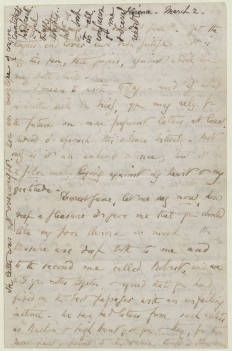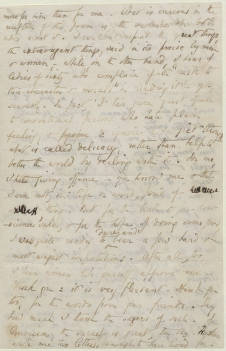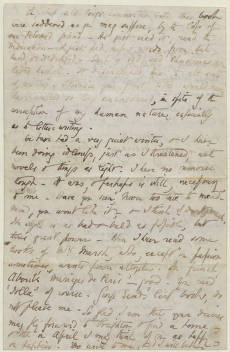Letter:
2 March [1857] Elizabeth Barrett Browning to Jane Wills-Sanford
Rare Item Analysis:
by Sarah Norman
A digital copy of the letter can be found in the Browning Letters database maintained by the Armstrong Browning Library at Baylor University: http://digitalcollections.baylor.edu/cdm/fullbrowser/collection/ab-letters/id/11152/rv/compoundobject/cpd/11158/rec/1 .
In the months following the publication of Aurora Leigh, Elizabeth Barrett Browning penned a letter to one of her close friends, Jane Wills-Sanford. The letter opens in a casual tone with Elizabeth apologizing for not having written recently and thanking her friend for reading her poem and making notes. The letter then naturally goes from Jane’s opinions and notes on Aurora Leigh to its overall public reception and other reviews that Elizabeth found noteworthy. Ultimately, this letter works to show those reading it today what happened after the end of Aurora Leigh and a multifaceted visualization of the author Elizabeth Barrett Browning.
Elizabeth describes the public reception of Aurora Leigh as “violent.” Elizabeth Barrett Browning knew while writing the poem that people would have distinctive reactions to it. She pleasantly reports that the book is selling well and would soon be going to a second printing. On one side, both men and women had wonderful things to say about Aurora Leigh, which would be Elizabeth’s best case scenario in her purpose behind writing it. She does not go into the details of the praiseworthy things she had heard, but incredulously tells Jane about a time she overheard a group of elderly women complaining that reading the poem would be a “risk to their character and morals,” following with the sarcastic comment “yes, seriously.” Elizabeth does note that Aurora Leigh had greatly offended the more conventional and conservative people of the time. She criticizes these people by claiming that they “hate plain speaking, and prefer to ignore a subject through what is called delicacy, rather than help to better the world by dealing with it.”
Elizabeth also describes professional critics’ reactions to Aurora Leigh. She excitedly says that several other authors, such as John Ruskin and Leigh Hunt, have read it and wrote to her with their notes, which were similar to Jane’s in their focus and commentary. One periodical listed by Elizabeth was the popular Blackwood’s Magazine. She described the review as “not ungenerous considering that it came from the camp of the enemy” – “the enemy” referring to the magazine’s editor, Mr. Aytoun. I find it difficult to believe that Aytoun’s review was as “not ungenerous” as Elizabeth described, since he had a serious distaste for Aurora as a character. He described Aurora as without the classic feminine charm “due to extreme independence” and disagreed with Elizabeth Barrett Browning’s assertion of what a poet’s purpose in writing should be. Elizabeth believed that a poet should show their audience what is dirty and wrong in the world in order to inspire them to change, whereas Aytoun believed that poets should “refine and purify as to purge out the grossest matter” and inspire change through showing the ideal and hoping people rise up to it. Another periodical review Elizabeth Barrett Browning describes is from the British Review, and she finds that one much harsher. She correctly assumes it was written by Coventry Patmore, the author of Angel in the House, and discounts his opinions by saying that she feels sorry more for him. Elizabeth flippantly disregards these critic’s reviews, standing by her work and her opinions without attacking them for their opposing views.
This letter not only shows readers what happened after Elizabeth Barrett Browning submitted Aurora Leigh to her publisher, but also works as a form of dramatic monologue. In Victorian literature, dramatic monologue functions to give insight into the speaker’s mind and characterize them. Elizabeth’s commentary throughout this letter humanizes her, and shows us another side besides “author.” This letter shows us a picture of Elizabeth as a friend and wife, as well as successful female poet. Through her dismissal of the negative reviews, Elizabeth shows that she values the opinions of loved ones more than those of professional critics and the general public. She writes that she did not write Aurora Leigh to offend anybody, but rather to “do good by her own conscience” and that she was willing to deal with the kickback from her writing to do good and be truthful to her conscience.
 |
 |
 |
 |

